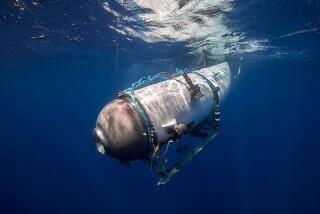King Putin?
Russian President Vladimir V. Putin faces a stark and fundamental choice that will affect his personal future and that of his nation. He can choose a weak successor who will not threaten his influence when he steps down in six months nor stand in the way of his becoming president again in 2012. Or Putin can choose a strong successor and risk his own political future. Right now, it’s a tossup on what he will do. But the choice profoundly matters: A Russia with a weak president trying to govern while Putin pulls the strings backstage would reduce internal stability and increase the security risk for the U.S. and the international community.
This conundrum became clear to me when I, as part of a group of international Russia watchers, met with Putin, senior Russian officials and other Kremlin insiders this month at the president’s dacha in Sochi. As in our previous meetings with him, Putin discussed a vast range of issues in great detail without the aid of notes or advisors. But this time I came away from the meeting worried about how Putin and his team would lead Russia forward.
In our discussion with the Russian leader, it was clear that the weak-successor scenario is under consideration. Putin’s surprise nomination of Viktor Zubkov as prime minister might be the first step. Although known as a strong manager, Zubkov is not considered a man of vision capable of leading a great power. Nevertheless, Putin sang his praises to us and said Zubkov could be a candidate in the March 2008 presidential election if he performs well in his new job. That’s much more of an endorsement than any of the other candidates have received, and no one doubts that Putin’s pick will be the next president.
Even more dramatic were Putin’s emphatic and repeated statements that he would retain substantial political power after the election, and that he and the next president would have to agree on how to work together. Putin is clearly considering some form of dual power in which he would exert influence as head of another institution. And he explicitly declined to rule out another run for president in 2012, which is permitted by Russia’s constitution.
Kremlin insiders told us of plans to redistribute power away from the presidency to a number of institutions over the next four years. Often mentioned were the United Russia party, which strongly supports Putin; the Constitutional Court; the State Council (an advisory body); the Duma; and the National Security Council. The main goal is clear: Whatever institution Putin ends up heading would become a repository of power that would box in a new president.
A weak president, a strong Putin and a broad diffusion of power among several institutions could be a train wreck for Russia and undo much of the stability that Putin has brought about. Although he has curbed democracy, Putin has strengthened the Russian state, kept inflation in check and presided over sustained economic growth.
But a system of dual power would be alien in a Russian political culture that traditionally channels power toward one person. In today’s Russia, it is Putin who settles disputes among competing factions. Who would play that role in a dual-power system is unclear. Even a weak president would grow in office and could clash with Putin. Regional governors could exploit confusion in Moscow to grab more power. To whom would foreign companies go for permission to consummate deals in the oil-and-gas sector? Who would have the final say about the conduct of foreign policy?
Redistributing power in Russia has its own pitfalls. In his eight years in office, Putin has painstakingly centralized power in the presidency by reducing the power of all other players, including regional governors and the media. Today’s system in Russia cannot act without direction from the top. To redistribute power next year, moribund institutions would have to be empowered, and that could cause instability as they compete for influence in a fluid environment.
To most Americans, the idea that centralizing power could ever be desirable is unthinkable. But Russian stability would be jolted by a quick and likely ill-planned redistribution of power. Over the long term, more checks and balances are much needed, but a rush job designed to protect Putin’s power until 2012 is a recipe for chaos, not good governance.
For the United States, a disorganized and inward-looking Russia would pose dangers. It would be unlikely to develop coherent policies on such key issues as nonproliferation, global terrorism and energy security. It would make doing business in the country more difficult because U.S. companies would be less sure of what the rules of the game were. And who would undertake fundamental reforms and a campaign against corruption to improve the business climate?
Putin has a far more attractive choice: opt for a strong president, play some role as an elder statesman and take his chances in 2012.
There are a number of strong potential presidential candidates who share Putin’s views. First Deputy Prime Minister Sergei B. Ivanov stands out. The presumed front-runner before Zubkov’s emergence, he remains a leading contender. Our group met with him minutes after Putin’s nomination of Zubkov was announced. Still, Ivanov gave a masterful two-hour presentation on numerous topics, including highly technical economic issues and foreign and defense policy. He has gravitas and shares Putin’s vision for Russia. A strong president who supports the core values of Putin’s Russia -- a large state role in the economy and an assertive foreign policy -- would better ensure stability than a system of dual power. He would have greater public legitimacy and be better capable of keeping the country on a steady course that the vast majority of Russians support. An Ivanov-like candidate would begin his term relatively strong and probably consolidate power after a year in office. If the new president does well, Putin’s chances of regaining power in 2012 diminish -- but that scenario feels a lot more like real democracy.
For the U.S., an Ivanov presidency would be no cakewalk. Russia’s confident elite would continue to push back on missile defense, Kosovo independence and other issues. But a Russia that knows and pursues its national interests would be good for us because it would be more inclined to act like a responsible regional power with a stake in the international system.
There’s still an even chance that Putin would take this latter path. Senior Russian officials say that the future endorsement by the United Russia party of a presidential candidate would provide Putin with another bite at the apple, and a strong person could ascend at that time. Zubkov would then remain prime minister through the elections and perhaps afterward.
So Putin has a choice to make. His final decision will have profound implications for Russia and its role in international affairs.
More to Read
Start your day right
Sign up for Essential California for news, features and recommendations from the L.A. Times and beyond in your inbox six days a week.
You may occasionally receive promotional content from the Los Angeles Times.






